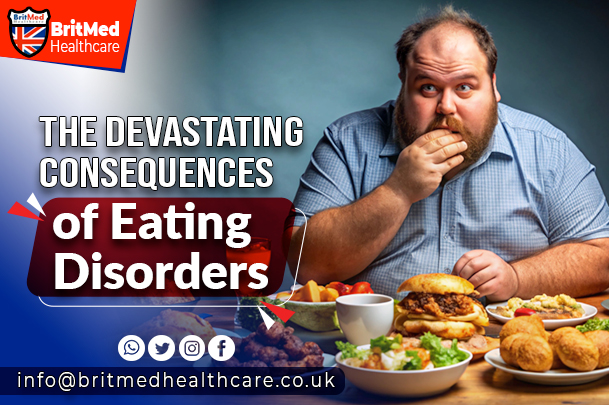The Devastating Consequences of Eating Disorders: Understanding the Complexities and Seeking Help
Within the UK, eating disorders have been a growing concern for all ages, backgrounds, and professions. These life-threatening mental health conditions have serious and long-lasting effects on the physical and emotional health, relationships, and overall quality of life of an individual. First, understanding the subtleties of eating disorders-their causes, their symptoms, and how they can be treated-allows for appropriate support and guidance to be given to the individuals concerned.
What are Eating Disorders?
Eating disorders are variants of mental health disorders typified by disturbed eating habits and an abnormal relationship with food. The most common forms of eating disorders include the following:
- Anorexia Nervosa: Characterized by a marked limitation of food intake, leading to a significantly low body mass index (BMI).
- Bulimia Nervosa: Characterized by recurrent episodes of binge eating followed by purging or compensatory behaviors to prevent weight gain.
- Binge Eating Disorder: Characterized by recurrent episodes of binge eating without subsequent purging or compensatory behaviors.
- Other Specified Feeding or eating disorders (OSFED): A category for eating disorders that do not meet the criteria for anorexia nervosa, bulimia nervosa, or binge eating disorder.
Causes and Risk Factors
Although the exact causes of eating disorders remain unknown, research suggests that they stem from an interplay between biological, psychological, and sociocultural factors. The risk factors can include:
- Genetic predisposition: Individuals who have a family history of eating disorders are more predisposed to having an eating disorder.
- Sociocultural pressures: The pressure that exists in the society in response to beauty standards, media influence, and cultural expectations may possibly give birth to body dissatisfaction and disordered eating.
- Comorbid mental health disorders: This may include depression, anxiety, or trauma that could increase the risk of eating disorders.
- Trauma: Experiences of childhood trauma may encourage eating disorders.
Signs and Complications
Eating disorders can manifest in various ways, including:
- Restricted eating: Severely restricting food intake or avoiding certain foods.
- Bingeing and purging: When one consumes a large amount, thereafter, inducing vomiting or resorting to compensatory behaviors.
- Weight fluctuations: Dramatic weight loss or gain due to restricted eating or bingeing.
- Emotional turmoil: Anxiety, depression, shame, and guilt associated with food and body image.
On the other hand, if the following physical complications arise and are not treated, eating disorders may reach dangerous levels. For example, over the course of time:
- Malnutrition: Inadequacy of various nutrients is reflected in symptoms such as tiredness, general weakness, and hair loss.
- Gastrointestinal complications: Constipation, diarrhea, bloating, abdominal pain.
- Cardiovascular complications: Heart palpitations, arrhythmias, even heart failure.
- Reproductive complications: Irregular menstrual cycles, infertility, hormonal imbalances.
Treatment and Recovery:
Fortunately, eating disorders are curable through a comprehensive approach that encompasses the following:
- Cognitive-behavioral therapy: Helping the person to identify negative thought patterns and behaviors related to food and body image.
- Family-based therapy (FBT): The treatment process involves the family members by creating a supportive and non-judgmental atmosphere.
- Medications: Treatment of symptoms with medication, such as anxiety or depression.
- Nutrition counseling: Teaching healthy eating habits and nutrition planning.
- Support groups: Support groups offer the opportunity to be in contact with others who have gone through the same experience.
Conclusion
Eating disorders are complex mental health issues that require a compassionate and understanding approach to treatment. Knowing such nuances of the disorders calls for us to provide the needed amount of help and guidance effectively to those affected. It is, therefore, very important to foster a positive body image culture that should encourage open discussions of mental health problems and also ensure access to evidence-based treatments to make certain that individuals experiencing eating disorders receive the help needed to recover and thrive.
References:
Get Help – National Eating Disorders Association
What Is Orthorexia? Signs And Symptoms Of The Eating Disorder (womenshealthmag.com)
Eating Disorders: 6 Types and Their Symptoms (healthline.com)
Websites:
Britmed Healthcare: https://britmedhealthcare.co.uk/
Nightingale Hospital: https://www.nightingalehospital.co.uk/
You can also book on Top Doctors UK Contact us on WhatsApp 08009708017
Top Doctors: https://www.topdoctors.co.uk/doctor/ahmed-el-missiry




